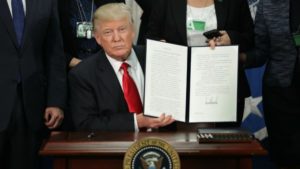by WorldTribune Staff, January 31, 2017
A new Rasmussen Reports survey found that 57 percent of likely U.S. voters, including 82 percent of Republicans, support President Donald Trump’s executive orders on immigration.
The survey was taken late last week, prior to the weekend protests against Trump’s executive orders imposing a four-month ban on all refugees and a temporary visa ban on visitors from Syria, Iraq, Iran, Libya, Somalia, Sudan and Yemen.

In the survey, conducted by telephone and online, 33 percent opposed the order while 10 percent were undecided.
Similarly, 56 percent of those polled favor a temporary block on visas prohibiting residents from the seven nations from entering the United States until the government approves its ability to screen for likely terrorists. Thirty-two percent oppose the temporary ban, and 11 were undecided.
The refugee ban is supported by 59 percent of voters not affiliated with either major party. Democrats are opposed by a 53 percent to 34 percent margin.
The president on Jan. 30 fired acting Attorney General Sally Yates for refusing to defend the immigration order.
The ACLU has vowed to fight Trump’s immigration ban all the way to the Supreme Court on grounds that it targets people of a certain religion, in direct violation of the First Amendment. (The same ACLU blamed Christians for the Orlando nightclub terror attack.)
Some observers, however, said the courts ultimately might uphold Trump’s order. The order’s alleged anti-Muslim thrust “is not clear to me,” said Eugene Volokh, a professor at UCLA School of Law. Judges might interpret the order as targeting people from countries where “jihadist sentiments” are common, he said.
The president generally has broad authority to exclude non-citizens from coming into the country, Volokh said.
Jonathan Turley, a law professor at George Washington University, predicted the courts would not interpret the order as a religious ban. “It is not on its face a Muslim ban,” he said. “That dog simply won’t hunt. No judge can look at the order and analyze it as a Muslim ban because the vast majority of Muslims around the world are not affected by the limitations placed on these seven countries.”
